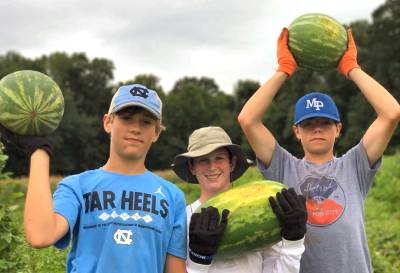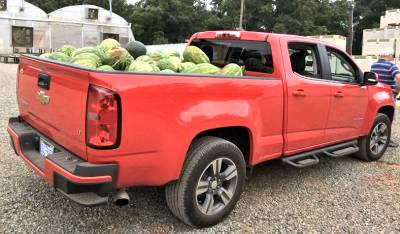By Jean Blish Siers *
 Teenagers threw watermelons at me this week. Really big watermelons. And if I’m honest, and I try to be, sometimes it really hurt. But I didn’t mind. Why? Because we were gleaning at a local farm and were able to send those watermelons off to agencies in four counties. We loaded trucks; we loaded cars; we loaded SUVs. And while we broke a few, we would take a minute, pull off our gloves, and reach in for big handfuls of juicy watermelon, delightful on a hot and humid July morning.
Teenagers threw watermelons at me this week. Really big watermelons. And if I’m honest, and I try to be, sometimes it really hurt. But I didn’t mind. Why? Because we were gleaning at a local farm and were able to send those watermelons off to agencies in four counties. We loaded trucks; we loaded cars; we loaded SUVs. And while we broke a few, we would take a minute, pull off our gloves, and reach in for big handfuls of juicy watermelon, delightful on a hot and humid July morning.
I learned a few lessons in the field this week.
- Teenagers, like most of us, do better when forced to slow down. At first, they wanted to see how big a watermelon they could pick up and throw, as we transferred them across the field like a bucket brigade. No amount of logical adult guidance could get them to stop. “Just because you can throw it doesn’t mean your friend can catch it and it will drop and break like the one before it and the one before that one.” What got them to slow down was good, old-fashioned exhaustion. But whatever gets us to pause, to focus, to contemplate the task at hand is usually a good thing, whether it’s exhaustion or old age (which I choose to call wisdom!)
- Sometimes the biggest prize is buried in the deepest vines and weeds. Parts of the patch were overgrown, not only with watermelon vines, but also morning glories, which tangled in with the fruit and often hid the largest watermelons, the ones that the farmers hadn’t bothered digging for since there were so many more easily harvested fruits.
- Blue skies are prettier but gray skies offer a gentle reprieve. We’ve been in the middle of a typical July heat wave here in the Charlotte, North Carolina area, with temperatures rising daily into to the 90’s, often with a heat index topping 100 degrees. We all appreciated the cloud cover, which ramped up the humidity a bit but kept the hottest sun off our heads and backs.
 There are few things better than spending a morning with people doing good things out of the goodness of their hearts. My arms and back grew tired in the field, but I had a great morning because I was with a local church youth group that came out to give back to the community. A handful of my regular volunteers and truck drivers came to help pick, load, and distribute. At the end of the morning, as I thanked the farmer for his incredible generosity of leaving that field for us, of taking part of his day to supervise us, he said, “Bless you for doing this, for getting that food to someone who needs it so it won’t go to waste!”
There are few things better than spending a morning with people doing good things out of the goodness of their hearts. My arms and back grew tired in the field, but I had a great morning because I was with a local church youth group that came out to give back to the community. A handful of my regular volunteers and truck drivers came to help pick, load, and distribute. At the end of the morning, as I thanked the farmer for his incredible generosity of leaving that field for us, of taking part of his day to supervise us, he said, “Bless you for doing this, for getting that food to someone who needs it so it won’t go to waste!”- No matter how much we do, people will still need more. This can be disheartening: We sent out 11,000 pounds of watermelons that morning, fresh from the field. Still, as I drove home, I thought of all the agencies in all the counties that couldn’t send trucks to pick up watermelons. When I got home, dirty and smelly and hungry, I checked my messages and had a call from a local distributor who had 20 bins of watermelons rejected by a grocer. Instead of showering and eating, I hit the phones and found agencies to pick up an additional 18,000 pounds of watermelons. And as great as that feeling was, there were several agencies that returned my call too late: the watermelons were gone.
One of the beauties of this job is learning, or at least remembering, important lessons every week. Can we stop all food waste? Can we feed all the people who need nutritious food? Will we get every melon safely from the field to the truck? No. Will our backs hurt and will we sweat? Yes. Can we — farmers, drivers, and gleaners — make a difference, one watermelon at a time? Definitely yes.
* Jean Blish Siers is SoSA’s Charlotte Area Gleaning Coordinator.
JUL
2017

 There are few things better than spending a morning with people doing good things out of the goodness of their hearts. My arms and back grew tired in the field, but I had a great morning because I was with a local church youth group that came out to give back to the community. A handful of my regular volunteers and truck drivers came to help pick, load, and distribute. At the end of the morning, as I thanked the farmer for his incredible generosity of leaving that field for us, of taking part of his day to supervise us, he said, “Bless you for doing this, for getting that food to someone who needs it so it won’t go to waste!”
There are few things better than spending a morning with people doing good things out of the goodness of their hearts. My arms and back grew tired in the field, but I had a great morning because I was with a local church youth group that came out to give back to the community. A handful of my regular volunteers and truck drivers came to help pick, load, and distribute. At the end of the morning, as I thanked the farmer for his incredible generosity of leaving that field for us, of taking part of his day to supervise us, he said, “Bless you for doing this, for getting that food to someone who needs it so it won’t go to waste!”